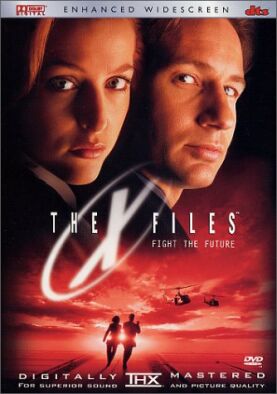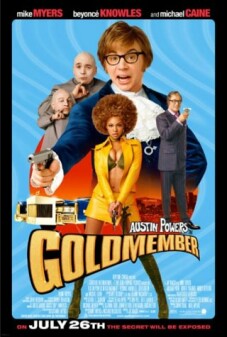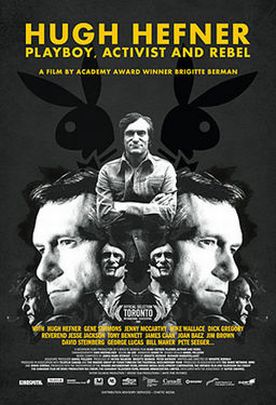X-Files, The
The X-Files, directed by Rob Bowman (no relation) and written by the series’s creator, Chris Carter, gives us an example of the perfect post-modern movie, because it presents to us a non-functional conspiracy. That is to say, the conspiracy is detached from its objective, or else the objective is so obscure that it remains unclear even by the end of the film. It is, in short, conspiracy for its own sake. There is something similar at work in The Truman Show, which never manages to convince us that there is anything to be gained by Christof and his henchmen, or indeed the whole world who are in on it, by keeping the secret from the title character that he is the star of a long-running soap opera. They just do it because it helps Truman’s fellow solipsists to identify themselves with him. Like all children, they imagine that the whole world is an organized plot to prevent them from doing what they want.
Likewise, in The X-Files we know that the conspiracy is something to do with the colonization of earth by space aliens, and that its members, led by Armin Mueller-Stahl, are said to be prepared to do anything “to protect their stake in the inevitable future. . .” But what this stake is, what the conspirators have to offer the apparently irresistible aliens or what, indeed, the latter are waiting for, is never made clear, either to us or to our heroes, FBI agents Mulder (David Duchovny) and Scully (Gillian Anderson). Paradoxically, Mulder is marked for death for knowing too much, though it is obvious he knows not nearly enough, or we should know it too. But fears or suspicions of conspiracy are now so common in the popular culture that they can presumably be taken for granted. When Mulder and Scully are chased around a cornfield it is by the “black helicopters” of popular mythology–even though we never find out why they are being chased, why they are not caught (something that looks absurdly easy the way the scene is shot), or what happens to the helicopters after they escape.
Once or twice there is an attempt to stand back from this claustrophobic environment a little and see the potential comedy in it. For instance, after the X-file investigations have been closed down by the FBI and Scully decides to quit and go back to doctoring, Mulder is left alone with the odds and ends of conspiracy which he is never able to put together. In a bar he tells the barmaid that he is on to a “global conspiracy” but that “no one believes me.” Down at the bureau, he says, they all call him “Spooky” — because, he says, his sister was abducted by aliens when she was a girl and he is determined to get to the bottom of the alien presence among us.
“I’d say that about does it, Spooky,” says the barmaid.
But just as all looks hopeless for his theories, along comes an even bigger believer in conspiracies than Mulder. Dr Alvin Kurzweil (Martin Landau) claims to have been a “fellow traveller” in the State Department with Mulder’s father (it is not clear whether he is using the term in the historical sense of a communist sympathizer or if he simply means that they served together). He has written all kinds of books promoting his crackpot theories about aliens and now tells Mulder more tantalizing details about the terrorist bombing of a government building in Dallas which he, Mulder, is being blamed for. In fact, the bodies of several victims of an alien-borne affliction were in that building. “Are you telling me they blew up the building just to hide the bodies of those four firemen?” asks Mulder incredulously.
“And that one little boy,” says Kurzweil.
“I think you’re full of s**t.”
Any one with a modicum of common sense would think the same, but of course, as we must expect these days, the crazy guy’s story checks out. The only problem is that the body of one of the firemen had been brought to Washington before the explosion (pretty poor coordination there, conspirators!) and Mulder and Scully get in by an absurdly simple ruse to see it, in spite of orders from a general that no one is to be admitted. After an examination, Scully finds that the secret of the corpse, on which no autopsy has hitherto been performed, is that the virus that killed it is made up of proteins unknown to science. All we know is that it is “a developing organism. . . living off life energy” of its victims and “digesting tissue and bone.”
The ever-knowledgeable Kurzweil comes up with some more information. The alien virus is in fact colonizing the planet, but knowledge of it is being hidden under news reports of outbreaks of the Hanta virus, carried by rats. This is enough to bring FEMA, the Federal Emergency Management Agency in, and FEMA, as Kurzweil informs us, is “the secret government” — ready at a moment’s notice to assume dictatorial powers. “While the rest of the world was fighting gooks and commies, they were secretly negotiating a planned Armageddon.”
“Who are ‘they’?” asks Mulder.
“I think you know,” replies Kurzweil.
It is another good joke to have Mulder comment to himself thereupon: “And they call me paranoid!” But the joke is as non-functional as the conspiracy, since the film doggedly returns to its wearisome adumbration of the supposed conspiracy as if it were the most plausible and serious thing in the world. Apparently there are strict limits on the levity with which even a hip show like The X-Files can treat wacko conspiracists. But we all need to ask, as Agent Scully does in a moment of lucidity: “Have we passed the point of common sense here?”
Discover more from James Bowman
Subscribe to get the latest posts to your email.






